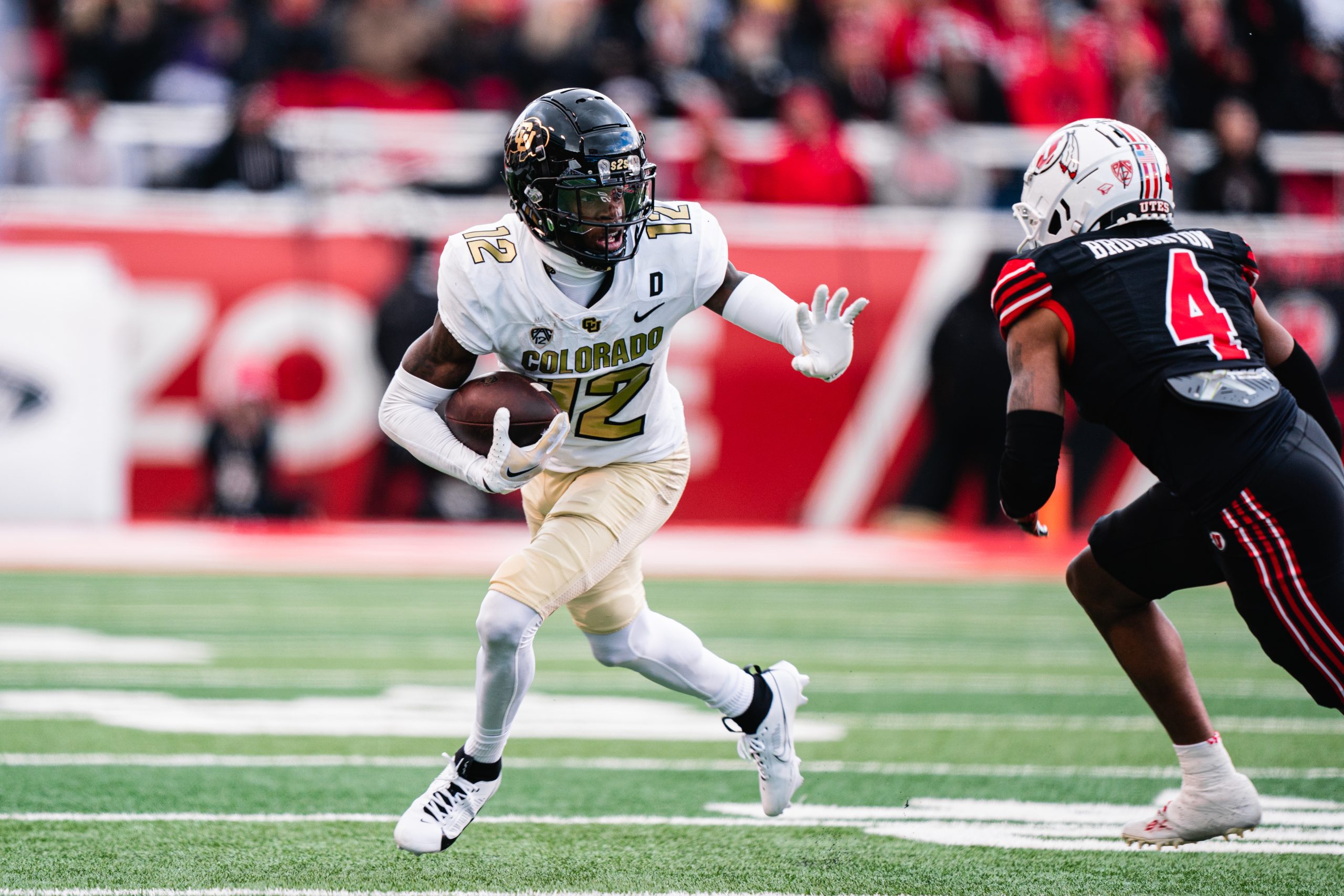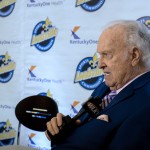2016
2016 WINNER – JABRILL PEPPERS (University of Michigan)
By Jason King
Note: This story appeared in the Bleacher Report on Nov.17, 2016. Bleacherreport.com, a division of Turner Sports, is a leading publisher of original and entertaining sports content and one of the fastest-growing sports media Web sites in the U.S. with 11 million unique visitors a month.
Tourists flock to the five-bedroom home in Ann Arbor often these days—including one group in October that knocked at 3 a.m.
Bleary-eyed, a man shuffled into the entryway, cracked open the door, and discovered a handful of University of Michigan students on the porch sporting maize and blue.
“Ummm, we heard this is Jabrill’s house,” one of them said. “Can we meet him?”
Resting in an upstairs bedroom as his roommate shooed the fans away, Jabrill Peppers couldn’t have been surprised. He’d grown used to the random pop-ins since that afternoon a few weeks earlier, when the redshirt sophomore made the only noteworthy mistake of his Heisman-caliber season.
Realizing he’d forgotten a bag of gear at home, Peppers left Michigan Stadium on foot less than two hours before a September kickoff. Snaking through campus, he was recognized by fans and tailgaters, some of whom followed him until he arrived at his residence a few blocks away on State Street.
Peppers retrieved his belongings.
But he’d lost his privacy.
His address no longer a secret, Peppers was greeted by a herd of autograph-seekers when he returned from the game that evening. A few days later, a student he’d never met dropped off a batch of pasta marinara with his roommates. Her mom made it for Jabrill, she told them. Others have made clever attempts to get a peek inside.
“Guys knock all the time and ask to use our restroom,” chuckles Raymond Smith-Byrd, one of Peppers’ four roommates. “People will try anything.”
Such is life for Peppers. Each time he touches the ball, his celebrity increases right along with Michigan’s national title hopes.
“I HAVE NOT COACHED A MORE VERSATILE PLAYER THAN JABRILL PEPPERS. THERE’S NOTHING HE CAN’T DO.”
— JIM HARBAUGH, MICHIGAN FOOTBALL COACH
One week, it could be a Vine-worthy punt return or a forced fumble. The next, a rushing touchdown, a pass breakup or a couple of sacks. No player in the country impacts the game in as many ways as Peppers, a sure future first-round NFL draft pick who will likely play his final regular-season game Saturday at Ohio State.
Even after mentoring him for two years, Wolverines head coach Jim Harbaugh continues to marvel at Peppers each time he watches him play.
“If there was a Bible sitting here,” Harbaugh says, “I’d say, ‘No, I have not coached a more versatile player than Jabrill Peppers.’ There’s nothing he cannot do.
“It’s the darnedest thing I’ve ever seen.”
Still, while his weekly appearances on highlight reels have made him the most recognizable college football player in the country, there’s another narrative about Peppers unfolding in Ann Arbor—a tale that makes Michigan fans cheer for their star even louder, one that makes it easy for parents to shell out $25 for the No. 5 jerseys sold on street corners each game day.
And this story has nothing to do with football.
• • •
After making a pit stop in the front office to introduce himself to the principal, Peppers marched into the auditorium and onto the stage last month at Community High School in Ann Arbor.
For the next 30 minutes, the 21-year-old and a few of his friends answered questions about study habits, time management and the transition from high school to college. Peppers spoke about what drives him on the football field—and the things that motivate him off it.
Then, with approximately 200 students staring back at him—hanging on his every word—one of the biggest stars in Michigan’s athletic history closed with some poignant advice.
“Be you!” he said. “Embrace all of the things that make you unique. Don’t let anything or anyone change you. Be you!”
Impressed as they were with Peppers’ speech, students that day were even more enamored with what he did next. Nearly everyone in attendance had pictures and memorabilia for Peppers to sign and selfies to take, but Peppers went a step further.
“He literally had an individual conversation with every single person who approached him,” says Brandon Jackson, a friend of Peppers who teaches world history at the high school. “I mean, we’re talking about 200 people. He asked every one of them something about themselves and answered more questions if they had them.
“Every kid that day walked away feeling good about themselves, feeling uplifted.”
Even more notable about Peppers’ visit to Community is that it was partially his idea. The plan was hatched about a month earlier in the living room of the home he shares with four of his brothers from the Omega Psi Phi fraternity. Peppers joined the organization last spring—but unlike in football, he wasn’t recruited.
“He sought us out,” says Terence Browner, a Michigan senior and member of the fraternity. “The more he learned about it, the more he felt the connection, the vibe. I could sense the excitement oozing off of him. He wanted to be a part of something.”
In Omega Psi Phi, Peppers found a group of men who share his passion for community service. With the fraternity, Peppers has participated in backpack drives for less fortunate children, arranged for speakers to address his chapter and others and served on panels about leadership and setting an example.
Coaches and teammates have always praised Peppers for the energy and spirit he brings to the field and to the locker room. Joining Omega Psi Phi has enabled him to affect people in a similar fashion away from the gridiron.
“He’s embracing the pedestal that sports has given him,” says Jackson, the high school teacher—and fraternity alumnus—who mentors Peppers. “He has a spirit and a charisma that you rarely see. He knows he has the ability to impact people, and that makes him feel good.
“He’s growing up right before our eyes.”
In Omega Psi Phi, Peppers is surrounded by positive influences both socially and in the classroom. Browner studies economics and sound engineering, and Smith-Byrd studies engineering. Another roommate, Leon Johnson, is a sports management major who will work for Adidas this summer.
Just like on the football field, if one fraternity member is slipping in the classroom or struggling in his personal life, someone is there to boost him up.
“Friendship is essential to the soul, and Jabrill is someone who cares deeply about relationships,” Smith-Byrd says. “For him, it was about more than joining an organization. He wanted those deep, personal connections.
“We give him a safe haven because we value him as a person. To us, he’s not No. 5 from the football team. He’s Jabrill Ahmad Peppers. That’s our brother.”
Peppers says his involvement with the fraternity has given him a new sense of pride, and that’s often visible on the football field. When he scores a touchdown or makes a key defensive tackle, it’s not uncommon for Peppers to salute Omega Psi Phi by forming the Greek symbol for Omega with his arms and hands. The gesture is known as “the hooks.”
Instead of Michigan garb, Peppers often hits the town sporting his fraternity’s colors: purple and gold. Peppers says his fraternity brothers keep him grounded. “I’ve got a second family up here now,” he says. “It’s all love.”
It’s easy to see why Peppers would yearn for a sense of family.
Peppers was seven years old when his father, Terry Peppers, was sent to prison on weapons charges. The two talked each week on the phone, but establishing a meaningful relationship was difficult. Jabrill went nearly 11 years without seeing his dad, who was released from prison in 2014.
Instead, Peppers looked to his older brother, Don Curtis, as a male role model. But when Jabrill was 14, Curtis was killed, shot in the face at a Chinese restaurant just a few blocks from their home in East Orange, New Jersey.
Even though Curtis had lived a wayward life in the streets, he was the one who sensed something special in Peppers and encouraged him to stay out of trouble as he pursued a career on the football field.
“Little bro, you’ve got a gift,” Peppers recalls Curtis saying. “If anyone can make it, it’s you.”
The words motivated Peppers, who won four state football titles—two at Don Bosco Prep and two at Paramus Catholic—and excelled in the classroom. While others in his neighborhood succumbed to the temptations of drugs, violence and gangs, Peppers channeled his energy toward sports and music. Peppers is an aspiring rapper who has already shot a music video.
“HE HAS A SPIRIT AND A CHARISMA THAT YOU RARELY SEE. HE KNOWS HE HAS THE ABILITY TO IMPACT PEOPLE, AND THAT MAKES HIM FEEL GOOD.”
— BRANDON JACKSON, OMEGA PSI PHI ALUMNUS
Academics were rarely a problem for Peppers, thanks in large part to his mother. Ivory Bryant once held her son out of a high school game simply because he got a C. Peppers is close with his mother and credits her for the person he’s become.
“Jabrill was always much older than what he seemed,” Bryant said after Michigan’s victory at Rutgers on October 8. “He was an old person in a young person’s body. Certainly the experiences he’s had, he had to grow up faster. You face a crisis, like when his brother died, and you ask yourself, ‘Am I going to stay on the path, or am I going to allow this to distract me?’ He used it to propel himself higher.”
Indeed, Peppers was the second-ranked player in the class of 2014 by ESPN.com and No. 3 according to Rivals. The summer before his senior year, he announced his commitment to Michigan on ESPNU by rapping lyrics to a song he’d written earlier that day.
“He was as well-known [in New Jersey] as anyone in the entire state,” says Roy Manning, the former Wolverines assistant who recruited Peppers. “I’ve been around some great athletes. I played at Michigan and in the NFL.
“Jabrill is a different breed. I’m not sure I’ve ever seen anything like him.”
As intense as the spotlight was back then in New Jersey, Peppers hadn’t seen anything yet.
• • •
When Jabrill Peppers visits Benny’s Family Dining for breakfast, waitresses at the popular Ann Arbor restaurant don’t need to ask what he wants.
They already know.
Four eggs and double orders of corned beef hash, toast and hash browns. “And orange juice,” owner Benny Shehaj says. “I guess you could call it the Jabrill Special.”
Name a high-profile Michigan athlete or coach from the past two decades, and they’ve probably been a regular at Benny’s. Charles Woodson was in a few weeks ago. Lloyd Carr and Bo Schembechler ate here, and there’s an autographed poster of Michael Phelps on the wall.
As close as he’s become to so many of the big names, Shehaj admits that Peppers has a personality like no other. Peppers and his mother eat breakfast at Benny’s after every home game. Just two weeks ago, the owner says, a heavily tattooed motorcyclist stopped Peppers as he was leaving and asked for a picture. Peppers was happy to oblige—just like he was seconds later in the parking lot, where a group of fans was waiting.
“Every time I see him, he’s smiling,” Shehaj says. “Something about him just makes people want to come up and talk to him. I told him, ‘Pretty soon you’re going to have to start driving around with tinted windows like Charles Woodson.’”
He may be at that point already.
Just like Woodson, who won the award in 1997, Peppers is believed to be in the mix for the 2016 Heisman Trophy. While the honor almost always goes to an offensive standout (Woodson was the last defensive player to win), Peppers’ versatility will surely be attractive to voters.
Peppers has played five defensive positions this season and has been used in multiple offensive formations, including the Wildcat. He also returns kicks and punts. Harbaugh wasn’t joking back in October when he compared Peppers to Jim Thorpe.
Peppers appreciates the praise his success has generated, and at times, he enjoys its rewards. Football has allowed him to meet childhood idols such as Woodson, Braylon Edwards, LaMarr Woodley and Deion Sanders. A few weeks ago, he received a message from Reggie Bush, a player he’s long tried to emulate and the reason Peppers wears No. 5. Bush passed along his phone number.
“That’s dope,” Peppers says.
Other times, though, Peppers says the attention makes him uncomfortable, that he prefers to “lay low.”
A fun night for Peppers means cutting up with his fraternity brothers in the living room while listening to Fetty Wap and eating a Vito sub (with extra mayonnaise) from Jimmy John’s. When it comes to nights on the town, he said he rarely wears Michigan gear in public and pulls the brim of his cap low beneath his forehead in hopes of going unnoticed while walking to South U Pizza on University, the main drag through campus.
And he can’t understand why people make such a fuss over someone simply because they’re good at sports. Or why people take such delight in needling him on Twitter.
Michigan’s coaches said they couldn’t be more impressed with the way Peppers has handled the celebrity he’s achieved through football.
“Everyone has times where the pressure mounts and builds,” says Michigan linebackers coach Chris Partridge, who coached Peppers in high school. “The great ones are the ones who don’t show it to their team and the people around them. Jabrill is always happy. He’s always energetic. But you know the pressure builds on him.
“That’s why football is so good for him. It allows him to focus.”
Jeff Hecklinski was Michigan’s recruiting coordinator under Brady Hoke when Peppers signed with the Wolverines in the spring of 2014.
Peppers played just three games as a true freshman before ankle and leg injuries ended his season. Hoke was fired a few months later after going 5-7.
“WHOEVER DRAFTS HIM…HE WON’T JUST CHANGE THEIR TEAM. HE’LL CHANGE THEIR ENTIRE CITY.”
— JEFF HECKLINSKI, FORMER MICHIGAN RECRUITING COORDINATOR
“There was a collective sigh when he got hurt,” Hecklinski says. “It changed our season. I can’t describe the energy he brings when he enters a building. I’ve never been around someone who can affect so many people with his personality.”
“You see him smile, and you become stronger. You feel like, with him in your corner, you can do no wrong. Whoever drafts him…he won’t just change their team. He’ll change their entire city.”
Peppers will have that opportunity soon.
Multiple NFL draft experts predict he will be a top-five selection in this spring’s NFL draft and Peppers has made no secret about his desire to improve the quality of life for his mother, who still lives in East Orange. And while he’s proved to be elite at the college level, there’s almost certainly some curiosity about how he’ll perform in the pros.
“He’s more focused than ever,” Smith-Byrd says. “He understands the situation. He’s at a point in his life where he’s close to achieving a goal he’s had since he was a child. He’s driven to make that goal a reality. There’s a larger purpose in front of him, and he’s not backing down.”
“It’s surreal,” Peppers says, to think about how far he’s already come—and where he could still go. Often, when he has time to himself, Peppers reflects on the prophecy his brother made all those years earlier.
“I can hear him now,” Peppers says. “He’s saying, ‘I told you, little bro. Just stick to the plan.’”
Banquet Program
Click here to view the program from the 2017 Paul Hornung Award Banquet honoring Jabrill Peppers.
Banquet Photos:
Click here to view all photos from the 2017 Paul Hornung Award Banquet
FINALISTS
Two defensive stars who also return kicks and spot play on offense, and a pair of prolific playmakers who play offense and return kicks have been named finalists for the seventh annual Paul Hornung Award presented by Texas Roadhouse and given annually to the most versatile player in major college football.
Chosen as finalists were defensive back Adoree’ Jackson (Southern Cal), linebacker / defensive back Jabrill Peppers (Michigan), running back / receiver Christian McCaffrey (Stanford) and wide receiver Dede Westbrook (Oklahoma).
Adoree’ Jackson
Jackson is a big play, lockdown cornerback who made circus catches on interceptions, spectacular plays returning punts and kicks, and influenced the game in spot play in the offensive backfield. He made two key interceptions in USC’s electrifying road win over number four-ranked Washington and made an acrobatic interception to end a drive deep in USC territory in the win over number 10-ranked Colorado. Jackson is a dangerous return man, averaging nearly 15 yards per punt return and 30 yards per kickoff return. He consistently helped USC with great field position with fair catches and by disrupting opponents’ kickoff and punt schemes. He earned consensus All-America at cornerback / return specialist and Pac-12 Defensive Player of the Year, won the Jim Thorpe Award as the nation’s best defensive back, and was a finalist for the LOTT Impact Award.
Christian McCaffrey
McCaffrey, who won the 2015 Paul Hornung Award, wass workhorse on offense and special teams who led the nation with 211.6 all-purpose yards per game; led the Cardinal in rushing, scoring, punt and kickoff returns; and was third on the team in receiving. Primarily a running back, McCaffrey also lined up at slot, wide receiver and “wild caff” quarterback. Named Pac-12 Player of the Year and Academic All-American of the Year, he accounted for 200+ all-purpose yards in nine games and 11 touchdowns despite being bracketed by defensive schemes all season. McCaffrey was a threat to score every time he touched the ball; he forced teams to adjust their kickoff and punting game plans to keep him in check. He also delivered outstanding field position by fair catching punts in tight situations.
Dede Westbrook
Westbrook was a big-play wider receiver / return specialist and prolific scorer with blazing speed who who earned consensus All-America honors, Big 12 Offensive Player of the Year, Biletnikoff Award as the nation’s top receiver and was a finalist of the Heisman Trophy. He was fourth in the nation in receiving yards per game, fourth in receiving touchdowns (15) and sixth in total receiving yards (1,354). He averaged 19.8 yards per catch, 12 yards per carry, 28.4 yards per kickoff return and 19.8 yards per punt return. He scored OU’s first two touchdowns in the win over Kansas and had 233 all-purpose yards and the game-winning score against Iowa State. His 14 touchdown receptions have averaged 45.4 yards, and 10 of his touchdown catches have come from at least 40 yards.












